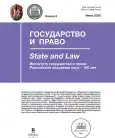Socially responsible behavior as a factor of stability and stability of modern state legal systems
- Autores: Stepanenko R.F.1,2
-
Afiliações:
- Kazan (Volga Region) Federal University
- TISBI University of Management
- Edição: Nº 6 (2025)
- Páginas: 7-17
- Seção: Philosophy of law
- URL: https://journal-vniispk.ru/1026-9452/article/view/305445
- DOI: https://doi.org/10.31857/S1026945225060014
- ID: 305445
Citar
Resumo
The article examines the problems of socially responsible behavior that imparts sustainability and stability to the functioning and development of modern state and legal systems. The author focuses on the relevance and appropriateness of using concepts and categories in theoretical state and legal studies that most specifically reflect the qualitative characteristics of interactions between individuals, society and the state (states) through the study of their behavioral models established and adjusted in accordance with the state and law. The behavioral paradigm in understanding and explaining the ongoing modifications of social relations is conceptualized in the scientific space of knowledge of social, including legal, responsibility at the micro level (individual behavior), macro level (collective behavior of subjects of legal relations) and mega level (state and interstate behavior), together giving ideas about the increasing role and importance of socially responsible behavior as a factor in maintaining the stability of state and legal systems. In the format of legal and state genesis, anthroposociogenesis, transformations and development of state-legal thinking, the problems of consensus and balance of interests of the individual, society and the state (states), as well as their socially responsible behavior, acquire new scientific contours of socio-humanitarian, including state-legal research, for the future (upcoming and long-term).
Sobre autores
R. Stepanenko
Kazan (Volga Region) Federal University; TISBI University of Management
Autor responsável pela correspondência
Email: stepanenkorf@yandex.ru
18 Kremlevskaya str., 420008 Kazan, Russia; 11/43 Mushtari str., 420012 Kazan, Russia
Bibliografia
- Baranov V. M., Romashov R. A. Personal dignity as a constitutional value: concept, practice, technique // Legal science and practice. Bulletin of the Nizhny Novgorod Academy of the Ministry of Internal Affairs of Russia. 2024. No. 1 (65). Pp. 23, 25 (in Russ.).
- Gorban V. S. The idea of glorification of the civil type of a strong personality in the doctrine of law by R. Iering // Society: politics, economics, law. 2017. No. 3. P. 55 (in Russ.).
- Zhukov V. N. The state // Philosophy of Law. Dictionary. / ed. and comp. V. N. Zhukov. 2nd ed., rev. and add. M., 2021. P. 148 (in Russ.).
- Zaznaev O. I. Trends in the development of the institute of the presidency in the modern world // Dialogue: politics, law, economics. 2024. No. 4 (18). Pp. 57–63 (in Russ.).
- Lazarev V. V. Constitution and axiology of state-legal ideology // Legal science: history and modernity. 2021. No. 1. Pp. 36–46 (in Russ.).
- Mal’ko A.V., Guryev V. V., Zatonsky V. A., Krotkova N. V. Legal culture and the state-legal life of society // State and Law. 2022. No. 8. Pp. 173–189. doi: 10.31857/S102694520021589-8 (in Russ.).
- Mal’ko A.V., Salomatin A. Yu. State and legal life of society in the context of globalization // State and Law. 2019. No. 3. Pp. 85–96 (in Russ.).
- Martyshin O. V. Philosophy of Law: textbook for masters. M., 2017. P. 343 (in Russ.).
- Law as a creator of a new social reality / ed. by Yu. A. Tikhomirov. M., 2024. P. 288 (in Russ.).
- Rayanov F. M. Horizons of domestic state-legal thinking and the needs for their expansion // The Rule of Law: theory and practice. 2018. No. 2 (52). Pp. 7–13 (in Russ.).
- Savenkov A. N. The state and law in the period of crisis of modern civilization. M., 2020. Pp. 173, 259, 324, 358, 361 (in Russ.).
- Tikhomirov Yu. A. The state. M., 2013. P. 81 (in Russ.).
- Tikhomirov Yu. A. Behavior in society and law // Journal of Russ. law. 2019. No. 5 (269). Pp. 8, 9 (in Russ.).
- Philosophy / ed. by V. N. Lavrinenko, V. P. Ratnikov. 2nd ed., rev. and add. M., 2001. Pp. 634, 635 (in Russ.).
- Frolova E. A. Methodology and Philosophy of Law: from Descartes to the Russian Neo-Kantians. M., 2025. P. 5 (in Russ.).
- Coleman J. S. Foundations of Social Theory. Belknap Press of Harvard University Press, 1990.
Arquivos suplementares









